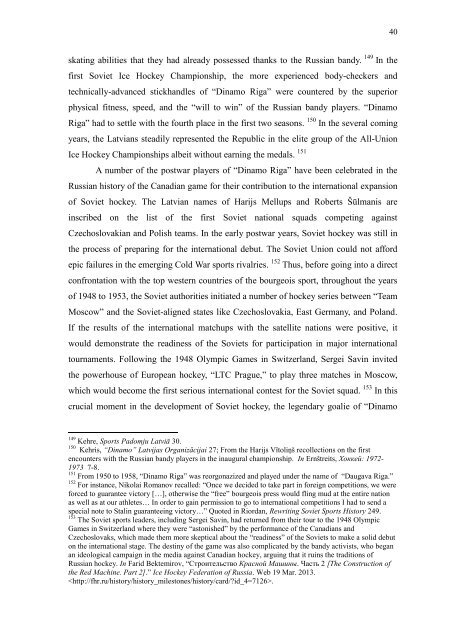University of Turku Faculty of Humanities Baltic Sea Region ... - Doria
University of Turku Faculty of Humanities Baltic Sea Region ... - Doria
University of Turku Faculty of Humanities Baltic Sea Region ... - Doria
Create successful ePaper yourself
Turn your PDF publications into a flip-book with our unique Google optimized e-Paper software.
40<br />
skating abilities that they had already possessed thanks to the Russian bandy. 149 In the<br />
first Soviet Ice Hockey Championship, the more experienced body-checkers and<br />
technically-advanced stickhandles <strong>of</strong> “Dinamo Riga” were countered by the superior<br />
physical fitness, speed, and the “will to win” <strong>of</strong> the Russian bandy players. “Dinamo<br />
Riga” had to settle with the fourth place in the first two seasons. 150 In the several coming<br />
years, the Latvians steadily represented the Republic in the elite group <strong>of</strong> the All-Union<br />
Ice Hockey Championships albeit without earning the medals. 151<br />
A number <strong>of</strong> the postwar players <strong>of</strong> “Dinamo Riga” have been celebrated in the<br />
Russian history <strong>of</strong> the Canadian game for their contribution to the international expansion<br />
<strong>of</strong> Soviet hockey. The Latvian names <strong>of</strong> Harijs Mellups and Roberts Šūlmanis are<br />
inscribed on the list <strong>of</strong> the first Soviet national squads competing against<br />
Czechoslovakian and Polish teams. In the early postwar years, Soviet hockey was still in<br />
the process <strong>of</strong> preparing for the international debut. The Soviet Union could not afford<br />
epic failures in the emerging Cold War sports rivalries. 152 Thus, before going into a direct<br />
confrontation with the top western countries <strong>of</strong> the bourgeois sport, throughout the years<br />
<strong>of</strong> 1948 to 1953, the Soviet authorities initiated a number <strong>of</strong> hockey series between “Team<br />
Moscow” and the Soviet-aligned states like Czechoslovakia, East Germany, and Poland.<br />
If the results <strong>of</strong> the international matchups with the satellite nations were positive, it<br />
would demonstrate the readiness <strong>of</strong> the Soviets for participation in major international<br />
tournaments. Following the 1948 Olympic Games in Switzerland, Sergei Savin invited<br />
the powerhouse <strong>of</strong> European hockey, “LTC Prague,” to play three matches in Moscow,<br />
which would become the first serious international contest for the Soviet squad. 153 In this<br />
crucial moment in the development <strong>of</strong> Soviet hockey, the legendary goalie <strong>of</strong> “Dinamo<br />
149 Kehre, Sports Padomju Latviā 30.<br />
150 Kehris, “Dinamo” Latvijas Organizācijai 27; From the Harijs Vītoliņš recollections on the first<br />
encounters with the Russian bandy players in the inaugural championship. In Ernštreits, Хоккей: 1972-<br />
1973 7-8.<br />
151 From 1950 to 1958, “Dinamo Riga” was reorgonazized and played under the name <strong>of</strong> “Daugava Riga.”<br />
152 For instance, Nikolai Romanov recalled: “Once we decided to take part in foreign competitions, we were<br />
forced to guarantee victory […], otherwise the “free” bourgeois press would fling mud at the entire nation<br />
as well as at our athletes… In order to gain permission to go to international competitions I had to send a<br />
special note to Stalin guaranteeing victory…” Quoted in Riordan, Rewriting Soviet Sports History 249.<br />
153 The Soviet sports leaders, including Sergei Savin, had returned from their tour to the 1948 Olympic<br />
Games in Switzerland where they were “astonished” by the performance <strong>of</strong> the Canadians and<br />
Czechoslovaks, which made them more skeptical about the “readiness” <strong>of</strong> the Soviets to make a solid debut<br />
on the international stage. The destiny <strong>of</strong> the game was also complicated by the bandy activists, who began<br />
an ideological campaign in the media against Canadian hockey, arguing that it ruins the traditions <strong>of</strong><br />
Russian hockey. In Farid Bektemirov, “Строительство Красной Машины. Часть 2 [The Construction <strong>of</strong><br />
the Red Machine. Part 2].” Ice Hockey Federation <strong>of</strong> Russia. Web 19 Mar. 2013.<br />
.
















